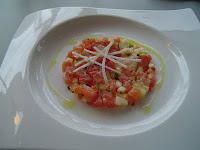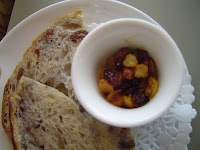 “Summer? What summer?”
“Summer? What summer?”
That seems to be the mantra echoing throughout much of Canada this year. Certainly, a lot of Torontonians have been muttering/twittering/blogging this along with the requisite complaints about too much rain, too much cold, and a shivery lack of typical sunshine-y weather. While I generally agree, this year hasn’t been the best, it has, on my own personal and professional levels, been filled with many happy events –outdoor barbeques, concerts, shows, and a myriad of fantastic interview experiences.
In pondering this good/bad conundrum as I turned the calendar into September, it occured that the perhaps the best possible ending for such a summer would be a wonderful meal. Fortunately, perhaps through happenstance or good fortune, I got just that. It turned out to be one of the best meals of my life, to be frank. I was in Stratford, Ontario recently, covering late-season openings and doing a story about the town’s incredibly rich foodie roots (look for it on Lucid Forge in the next few weeks). Food writing is really becoming a huge passion of mine; it’s as if I’ve transferred my stunted passion for painting into the kitchen, where palette becomes canvas and tools –heat, cold, blenders, processors –marry with colours (that is, ingredients) to produce a wonderful experience that is primal and intimate. At the same time as such specificty of experience occurs, I acknowledge that eating is a universal experience; it’s no secret that food is the magical, magically simple thing that binds humanity.
 So it was with more than a little wonder and a bucket of gratitude that I accepted an invitation to dine at Rundles, one of Stratford’s top restaurants. I would truly wager that Rundles is one of the finest in Canada, actually, but not having eaten my way across the country (yet), I can’t quite say for certain. Regardless, it was a gorgeous meal, and ranks among the top three of my life (you’ll have to keep tuned to the blog to find out what the other two were!). Owner Jim Morris truly, deeply understands the powerful connecting force of food, and is keenly aware of the deep, lasting pleasure a good meal can bring. I shared my space with a large party of eight beside me, who chatted theatre (naturally) along with commenting on the food, as I listened in and savoured every little drop of my own succulent meal. It’s amazing how good food, well-presented, with attentive service, in a creative, open atmosphere, has such a healing, calming effect. A good meal isn’t just about getting what you want, but sensing the chef is nourishing you with what you need. Food becomes prayer, meditation, celebration, and exchange.
So it was with more than a little wonder and a bucket of gratitude that I accepted an invitation to dine at Rundles, one of Stratford’s top restaurants. I would truly wager that Rundles is one of the finest in Canada, actually, but not having eaten my way across the country (yet), I can’t quite say for certain. Regardless, it was a gorgeous meal, and ranks among the top three of my life (you’ll have to keep tuned to the blog to find out what the other two were!). Owner Jim Morris truly, deeply understands the powerful connecting force of food, and is keenly aware of the deep, lasting pleasure a good meal can bring. I shared my space with a large party of eight beside me, who chatted theatre (naturally) along with commenting on the food, as I listened in and savoured every little drop of my own succulent meal. It’s amazing how good food, well-presented, with attentive service, in a creative, open atmosphere, has such a healing, calming effect. A good meal isn’t just about getting what you want, but sensing the chef is nourishing you with what you need. Food becomes prayer, meditation, celebration, and exchange.
I last visited Rundles well over ten years ago. I wasn’t sure about foodie culture then –indeed, the term “foodie” had yet to be invented –but I knew I liked fine dining and good eats. I always preferred one good ingredient –or a few simple ones –as opposed to fancy, process-oriented dishes requiring a scouring of markets and shops. I remember living in Ireland and making a simple vegetarian paprikas for a Christmas potluck party; seasoned vegetables, hearty and stewy and slightly spicy, seemed to be just what was needed during the gloomy, wet Irish winter. It wasn’t just about being full, but about feeling nourished. Going to restaurants, I tended to shy away from molecular gastronomy (the kind espoused by El Bulli) and enjoy the simple, hearty flavours of a lovingly prepared dish. Cooking myself, I always eschewed fancy techniques in favour of using good, wholesome ingredients –and for the most part, I still do. Sometimes it’s best to let the ingredients speak for themselves, without interfering. It reminds me of that old saying, that the song or painting is there, if you just get out of the way. Or like the line from “Unknown Caller,” off of U2’s latest album: “Shush now /cease to speak /that I may speak…” Sometimes you just have to get out of the way to let art –whether it’s cooking, music, painting or any other discipline -do its thing.

 Thus, it was with so much elation and enjoyment that I found Chef Neil Baxter sharing this approach in Stratford. What a joy, to find lamb cooked with this much care and respect! But I suppose I ought to go in order in recounting –and celebrating –such a beautiful meal. Without further adue, details: I started with a smoked salmon appetizer, but not the typical thinly-sliced shards of fish you’d expect. This dish, featuring salmon that was smoked on-premises, was paired in a small shallow dish with salmon rose, apple, and jellies. Everything was diced into tiny cubes. The effect was… well, different, and not easy, at first to place. Textures –soft, gummy, crunchy –and tastes –sweet, salty, smoky –danced and whirled on the palette in a subtle, if powerful, combination. Here was a new gastronomic experience; along with taste, the colour combination –the tender green flecks of the apple, the rusty pinks of the salt, the orange, glassy globules of roe and the glassy edges of the jelly –reminded me of a cubist work, or of the work of pointillist Georges Seurat. Here, my eyes weren’t just doing the mixing; so was my mouth. Yes, the appetizer was for a more sophisticated palette –but then walking into Rundles, you know you won’t be subjected to dreary openers like French onion soup or (heaven forbid) jalapeno poppers. Like the best art, the appetizer felt like proper, adult food –an introduction to something grand -and really, I don’t think one should apologize in such matters.
Thus, it was with so much elation and enjoyment that I found Chef Neil Baxter sharing this approach in Stratford. What a joy, to find lamb cooked with this much care and respect! But I suppose I ought to go in order in recounting –and celebrating –such a beautiful meal. Without further adue, details: I started with a smoked salmon appetizer, but not the typical thinly-sliced shards of fish you’d expect. This dish, featuring salmon that was smoked on-premises, was paired in a small shallow dish with salmon rose, apple, and jellies. Everything was diced into tiny cubes. The effect was… well, different, and not easy, at first to place. Textures –soft, gummy, crunchy –and tastes –sweet, salty, smoky –danced and whirled on the palette in a subtle, if powerful, combination. Here was a new gastronomic experience; along with taste, the colour combination –the tender green flecks of the apple, the rusty pinks of the salt, the orange, glassy globules of roe and the glassy edges of the jelly –reminded me of a cubist work, or of the work of pointillist Georges Seurat. Here, my eyes weren’t just doing the mixing; so was my mouth. Yes, the appetizer was for a more sophisticated palette –but then walking into Rundles, you know you won’t be subjected to dreary openers like French onion soup or (heaven forbid) jalapeno poppers. Like the best art, the appetizer felt like proper, adult food –an introduction to something grand -and really, I don’t think one should apologize in such matters.





 My second course was lamb (farmed locally, of course). Now, I am notoriously fussy on my lamb. It happens to be my favourite of meats, and having had too many awful dishes at various restos, and bunged up a couple dishes myself –or used less-than-quality meat –I can tell you that my level of quality discernment has gone sky-high when it comes to ordering –and eating –lamb. I very rarely do order it when eating out, in fact, but I had a feeling Rundles might get it right. In fact, they did more than this. The lamb had to be the very best, most succulent thing I’ve eaten in a long while. Lovingly prepared and served in delicate slices on top of a small, inconspicuous mound of snowy, near-liquid goat cheese, surrounded by gently steamed veg, it sat in a pool of its own luscious juices (handily, the bread server appeared at just the right moment, providing a gorgeously crusty baguette for mopping up said juices, natch). Baxter smartly, rightly refrained from ruining such a beautiful piece of meat with spicing, and instead, allowed the deep, earthy flavours of the lamb to sing forth, thanks to sensitive, smart, intuitive cooking. The lima beans that accompanied were the perfect, bitter plate companions; with their snap, they contrasted the lamb’s soft, buttery texture beautifully, and their sourness nicely complemented the meat’s rich flavour. I put my fork down more than once after each morsel, swooning, sighing, and sitting back to contemplate each joyous mouthful, enjoying the view of Lake Victoria, and the beautiful, English landscaping that adorns the front of the restaurant. To borrow an old koan, I was one with the food experience. And loved every second of it, too.
My second course was lamb (farmed locally, of course). Now, I am notoriously fussy on my lamb. It happens to be my favourite of meats, and having had too many awful dishes at various restos, and bunged up a couple dishes myself –or used less-than-quality meat –I can tell you that my level of quality discernment has gone sky-high when it comes to ordering –and eating –lamb. I very rarely do order it when eating out, in fact, but I had a feeling Rundles might get it right. In fact, they did more than this. The lamb had to be the very best, most succulent thing I’ve eaten in a long while. Lovingly prepared and served in delicate slices on top of a small, inconspicuous mound of snowy, near-liquid goat cheese, surrounded by gently steamed veg, it sat in a pool of its own luscious juices (handily, the bread server appeared at just the right moment, providing a gorgeously crusty baguette for mopping up said juices, natch). Baxter smartly, rightly refrained from ruining such a beautiful piece of meat with spicing, and instead, allowed the deep, earthy flavours of the lamb to sing forth, thanks to sensitive, smart, intuitive cooking. The lima beans that accompanied were the perfect, bitter plate companions; with their snap, they contrasted the lamb’s soft, buttery texture beautifully, and their sourness nicely complemented the meat’s rich flavour. I put my fork down more than once after each morsel, swooning, sighing, and sitting back to contemplate each joyous mouthful, enjoying the view of Lake Victoria, and the beautiful, English landscaping that adorns the front of the restaurant. To borrow an old koan, I was one with the food experience. And loved every second of it, too.



 A beautiful cheese plate was the final course. With three of the four cheeses provided by excellent local dairy producer Monforte, they included, among others, my very-favourite Toscano, along with a soft cheese from Quebec. The plate, artistically presented with a cheerful showering of fresh greens (which, I think, originated at Antony John’s Soiled Reputation farm, just five minutes outside of Stratford), also included fresh, tasty walnut bread and a sweet raisin compote. Those who know me well know I would easily -and quite happily –subsist on cheese and good wine (and may well do, when I visit France next year). Accompanied by a glass of sweet port, the third course was the perfect ending to a wonderful meal. I do wonder, however, about the rhubarb soup too –it might’ve more suitably complemented the richness of the lamb a bit better, but alas, one wears white and one’s food options shrink considerably.
A beautiful cheese plate was the final course. With three of the four cheeses provided by excellent local dairy producer Monforte, they included, among others, my very-favourite Toscano, along with a soft cheese from Quebec. The plate, artistically presented with a cheerful showering of fresh greens (which, I think, originated at Antony John’s Soiled Reputation farm, just five minutes outside of Stratford), also included fresh, tasty walnut bread and a sweet raisin compote. Those who know me well know I would easily -and quite happily –subsist on cheese and good wine (and may well do, when I visit France next year). Accompanied by a glass of sweet port, the third course was the perfect ending to a wonderful meal. I do wonder, however, about the rhubarb soup too –it might’ve more suitably complemented the richness of the lamb a bit better, but alas, one wears white and one’s food options shrink considerably.
 I ought to mention details here, as they are so very important, and are the furthest things taken for granted at Rundles. First, the butter. That pale, hard, near-waxy thing one gets to accompany bread at most restaurants in a dreary little cup is here given the five-star treatment; with a deep, golden sunflower-kissed tone and adorned with shards of rock salt, the small, rich cube is presented proudly erect on its own little stand, emblazed with Rundles trademark “R”. This was a churner’s delight. I normally don’t eat butter on anything but toast –and even then, might spring for jam, so disgusted am I by the insipid blandness of most butters out there –but I couldn’t stop myself (nor did I want to) from taking small, delectable slivers and spreading them onto the fresh, moist slices of sourdough bread proffered by genteel wait staff. It tasted fresh, alive, creamy on the tongue. Gorgeous.
I ought to mention details here, as they are so very important, and are the furthest things taken for granted at Rundles. First, the butter. That pale, hard, near-waxy thing one gets to accompany bread at most restaurants in a dreary little cup is here given the five-star treatment; with a deep, golden sunflower-kissed tone and adorned with shards of rock salt, the small, rich cube is presented proudly erect on its own little stand, emblazed with Rundles trademark “R”. This was a churner’s delight. I normally don’t eat butter on anything but toast –and even then, might spring for jam, so disgusted am I by the insipid blandness of most butters out there –but I couldn’t stop myself (nor did I want to) from taking small, delectable slivers and spreading them onto the fresh, moist slices of sourdough bread proffered by genteel wait staff. It tasted fresh, alive, creamy on the tongue. Gorgeous.
Equally wonderful was –is –the sense of occasion in dining at Rundles. While service is formal, atmosphere is not –it’s jovial and classy, simultaneously. You feel, walking through the front door, and into the welcoming light-filled foyer, that there is a real integration between the old and the new; the front garden teems with wildflowers and bursts of emerald greens, while inside the restaurant, the cool architecture of Shim-Sutcliffe (who seem to have a contemporary-meets-rural design ethos) contrasts and yet somehow complements all this wild natural beauty. Morris, in the tasteful, old world fashion-meets-modern-mod-look of Yohji Yamamoto, welcomes you as white-clad servers stroll by.



 But don’t let their suits alarm you; the atmosphere isn’t, for a moment, stuffy or pretentious, but quite the opposite. Servers at Rundles welcome questions about ingredients, their source, and methods of cooking. The occasion isn’t just about fine dining, but about making food education part and parcel of the experience. This could be because in the winter, the restaurant serves as a teaching ground for the Stratford Chefs School. The care and attentiveness given food in the kitchen is reflected in a creative, thoughtful mix of visual styles throughout the restaurant. With art by Viktor Tinkl (including whimsical plate covers) set against the white, clean backdrop of Phillip Starck designs, you really don’t feel as if you’re required to wear a ball gown to dine, but rather, you’re in a comfortable, arty, airy space where conversation flows as smoothly as the dishes coming from Baxter’s kitchen. This is a place to learn, grow, and share; it will nourish with both tangible and non-tangible entities, just as any good establishment should do. With huge windows overlooking the lovely English gardens both in front and to the side of the restaurant, it’s a new-meets-old ethos. Rundles was the perfect ending to a wonderful summer. They’re actually open to mid-October –so summer might be extended, for just a little while yet.
But don’t let their suits alarm you; the atmosphere isn’t, for a moment, stuffy or pretentious, but quite the opposite. Servers at Rundles welcome questions about ingredients, their source, and methods of cooking. The occasion isn’t just about fine dining, but about making food education part and parcel of the experience. This could be because in the winter, the restaurant serves as a teaching ground for the Stratford Chefs School. The care and attentiveness given food in the kitchen is reflected in a creative, thoughtful mix of visual styles throughout the restaurant. With art by Viktor Tinkl (including whimsical plate covers) set against the white, clean backdrop of Phillip Starck designs, you really don’t feel as if you’re required to wear a ball gown to dine, but rather, you’re in a comfortable, arty, airy space where conversation flows as smoothly as the dishes coming from Baxter’s kitchen. This is a place to learn, grow, and share; it will nourish with both tangible and non-tangible entities, just as any good establishment should do. With huge windows overlooking the lovely English gardens both in front and to the side of the restaurant, it’s a new-meets-old ethos. Rundles was the perfect ending to a wonderful summer. They’re actually open to mid-October –so summer might be extended, for just a little while yet.
Note: Full gallery of from my Rundles experience can be found at my Flickr page.

These considerations were in the front of my mind coming away from an evening at George, a gorgeous, Zagat-rated restaurant in downtown Toronto. Having been invited by a friend who is a member at the adjoining (and quite frankly, awesomely inspiring) Verity Club, I was curious about the mix of old and new world cuisine that George seemed so renowned for. It may not be molecular gastronomy in the true sense, but it mixed flavours, textures, colours and shades in ways I hadn’t experienced -at least orally -before.
In lieu of the main menu, my companion and I opted for the 5-course tasting menu, each of us receiving one delectable -and different – treat after another. One of the appetizers was a salad and seafood affair, another wafer-thin layers of tender, flavoursome sirloin nestled in delicate tasty nests of fois gras. A lovely palate-cleanser of saffron-ginger sorbet acted as an intermission between the wondrously delicious arias. Main consisted of gorgeous, rich entrecotes of beef, cooked in that gentle, knowing way that produces blushing-pink pink that melted on the tongue. Dessert was a selection of goodies made from Meyer lemons (which my companion enjoyed thoroughly) and chili-chocolate cake (mine -and I confess to wanting another piece ever since), followed by a selection of cheese and fruit, simply, elegantly presented.
Lorenzo Loseto and his expert kitchen team lovingly create beautiful dishes that possess a kind of old-meets-new aesthetic; they marry old-world hearty flavours with new-world experimentation, adding in generous portions of clean, artistic presentation that is never fussy but rather, presents food as paintings, complete with colours, textures, shape and shadow, on the blank, smooth palette of white porcelain.
A meal at George was, easily, one of the most memorable experiences of my life, and I rate it as a true culinary destination for both visitors and inhabitants of Toronto. Comforting home-cooking it’s not -but nor should it be. Unique, special artistic… delicious. I think my culinary colour range just grew -and for that, I can only be deeply grateful.
